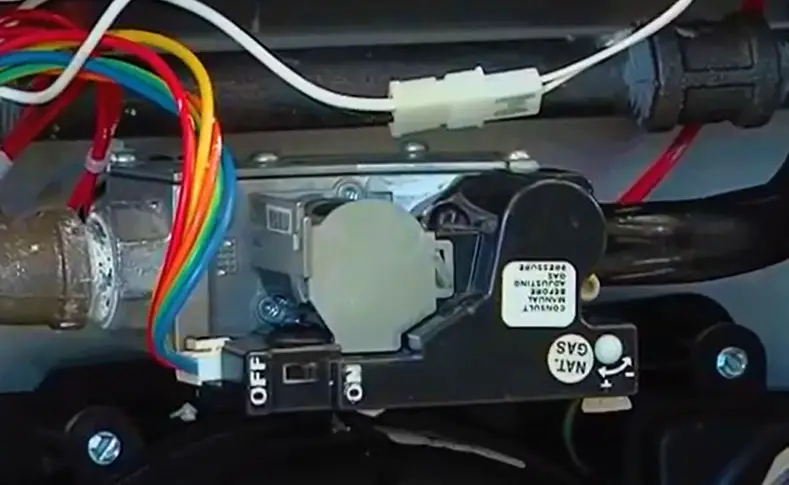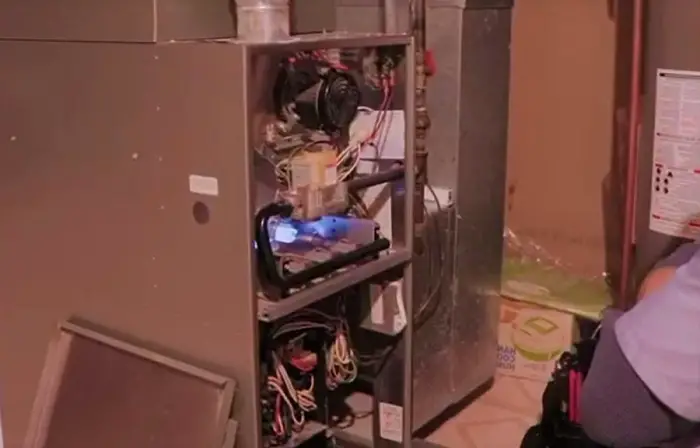| Note: This article may contain affiliate links, which means if you make a purchase following our links won’t cost you extra, but we may earn a commission. Learn more |
If your furnace is on the fritz, you may be wondering if it’s time to repair or replace it.
There are a few factors to consider when making this decision, such as the age of your furnace, the severity of the problem, and the cost of repairs. In general, furnaces that are more than 15 years old should be replaced.
If your furnace is newer than that, but you’re having repeated problems with it, replacing it may also be a good option. The cost of repairs can also play a role in your decision. If the repair will cost more than half the price of a new furnace, it’s probably time for an upgrade.
If your furnace is less than 15 years old but needs frequent repairs, it may also be time to consider replacing it. The bottom line is that you want your furnace to be reliable – you don’t want to be left in the cold! The cost of repairs is also a factor to consider.
If the repair costs are significant – more than half the cost of a new furnace – then it makes more sense to replace rather than repair.
If replacement parts for your furnace are no longer available, then you have no choice but to replace the entire unit. So, when faced with a broken furnace, what should you do?
Weigh all the factors and make a decision based on what makes the most sense for you and your home.
Learn More: Can You Bypass A Pressure Switch On A Furnace?
When Should You Repair Or Replace Your Furnace?
If your furnace is more than 15 years old, it might be time to start thinking about replacing it. Even if it’s still working well, a newer model will be much more energy-efficient, which could save you money on your utility bills.

If your furnace is having issues like strange noises, uneven heating, or short cycling (turning on and off frequently), it’s probably time for a repair.
You might be able to fix the problem yourself if it’s something simple, like changing the air filter. But if the issue seems more complicated, it’s best to call in a professional.
Before you make any decisions about repairing or replacing your furnace, be sure to get multiple quotes from different contractors.
That way, you can compare prices and find the best option for your needs and budget.
Is It Worth Repairing a 20-Year-Old Furnace?
If your furnace is over 20 years old, it may be time to start shopping for a replacement. While you can technically have your old furnace repaired, it may not be worth the money or effort. Here’s a look at why replacing an old furnace is often the best option.
The Efficiency of New Furnaces One of the biggest reasons to replace an old furnace is efficiency. Older furnaces typically have an annual fuel utilization efficiency (AFUE) rating of around 60%.
This means that for every $1 you spend on heating, only $0.60 goes towards actually heating your home. New furnaces, on the other hand, have AFUE ratings of 80% or higher. That extra 20% can make a big difference in your energy bills – especially if your furnace is running constantly to keep your home warm.
New Furnaces are More Reliable Another reason to consider replacing an old furnace is reliability. As furnaces age, they become more likely to break down and need repairs.
If you’ve already had to repair your furnace once (or multiple times), it’s probably not going to get any better with age. A new furnace will be more reliable and shouldn’t give you any trouble for many years to come. In fact, most furnaces come with a warranty that covers major repairs – something you won’t find with an older model.
Read More: Signs Your Furnace Is Going To Explode?
Should I Replace My 25-Year-Old Furnace?
It’s been a long, cold winter. And your furnace has been working overtime to keep your home warm and comfortable. But now that spring is finally here, you may be wondering if it’s time to replace your 25-year-old furnace.
Here are a few things to consider when making your decision:
1. Efficiency – Today’s furnaces are much more efficient than those of yesteryear. If your furnace is more than 20 years old, it’s likely that it’s only 60% efficient.
That means 40% of the heat it produces is wasted. Replacing it with a newer, more efficient model could save you money on your energy bills.
2. Maintenance – An older furnace is also more likely to need repairs and maintenance than a newer one.
So, if you’re already spending money to keep your old furnace running, that could be another reason to consider a replacement.
3. Safety – An outdated furnace may not meet current safety standards and could pose a risk to your family should something go wrong. A new furnace will have all the latest safety features and give you peace of mind knowing that your family is safe from harm.
If you’re thinking about replacing your 25-year-old furnace this spring, weigh all the factors carefully before making a decision. It may just be the best thing for you and your family in the long run!

Repair Or Replace 12-Year-Old Furnace
Most furnaces last between 15 and 20 years. If your furnace is 12 years old, it may be time to start thinking about replacing it. However, there are a few things you can do to prolong its life and avoid having to replace it prematurely.
First, make sure that you keep up with regular maintenance. This includes changing the filter every 1-3 months, depending on the type of filter you have. You should also have the furnace serviced by a professional once a year to ensure that everything is in good working order.
If you notice any strange noises coming from your furnace or if it starts acting up, don’t ignore them! These could be signs that something is wrong and needs to be repaired. It’s best to call a professional right away so they can diagnose the problem and fix it before it turns into something bigger (and more expensive).
Of course, eventually, your furnace will reach the end of its lifespan no matter how well you take care of it. When this happens, you’ll need to decide whether to repair or replace it. This decision depends on several factors, such as the severity of the damage, the cost of repairs, and whether or not your furnace is still under warranty.
Ultimately, only you can decide what’s best for your home and your budget.
Repair Or Replace 20-Year-Old Furnace
If your furnace is more than 20 years old, it may be time to start thinking about replacing it. While a new furnace will certainly be a significant investment, it could end up saving you money in the long run – both in terms of energy efficiency and repair costs. An older furnace is likely to be less energy-efficient than a newer model, meaning that you’ll end up paying more for heating your home.
In addition, an older furnace is more likely to break down, and repairs can be expensive. So, if you’re thinking about replacing your old furnace, what should you do? First of all, it’s important to get some professional advice.
A qualified HVAC contractor will be able to assess your individual situation and advise you on whether a new furnace is the best option for you. Once you’ve decided to replace your furnace, the next step is choosing the right model. There are many different types and sizes of furnaces available on the market today, so it’s important to select one that will meet your specific needs.
Once again, a professional HVAC contractor can help with this process.
Finally, when it comes time to install your new furnace, make sure that it’s done properly by a qualified technician. This will ensure that your furnace operates safely and efficiently for many years to come.
Should You Replace a Furnace Before It Breaks?
If your furnace is more than 15 years old, it might be time for a replacement. Even if it’s still working, an outdated furnace may not operate as efficiently as a newer model. That means you could be paying more for energy costs every month.
Here are some other signs that indicate it might be time to replace your furnace: The furnace makes strange noises. If you hear banging, popping, or hissing coming from your furnace, that’s a sign that something is wrong.
These sounds could indicate that there’s something loose inside the unit or that parts are wearing out. You see rust on the furnace. Rust is a sign of age and wear and tear.
It can also reduce the efficiency of your furnace over time. Your energy bills have increased significantly. If you notice a sudden spike in your energy bills, it could be due to an inefficient furnace that’s working overtime to heat your home.
You have frequent repairs. If you find yourself making constant repairs to your furnace, it might be time for an upgrade. A new furnace will likely be more reliable and require less maintenance than an older one.
If you think it might be time to replace your furnace, talk to a heating contractor about your options.
Should I Replace My 17-Year-Old Furnace?
It’s been a long, cold winter and your furnace has been working overtime to keep your home warm. But now it’s starting to make some strange noises and you’re wondering if it’s time to replace it. So, should you replace your 17-year-old furnace?
Here are a few things to consider:
1. How much does it cost to operate?
If your furnace is costing more and more to run each year, it may be time for an upgrade.
A new, energy-efficient furnace can save you money on your energy bills each month.
2. How often do you have to repair it?
If you find yourself calling for repairs more often than in the past, it may be time for a new furnace.
Frequent repairs can be expensive and a new furnace will likely last longer before needing repairs.
3. Is your home comfortable?
If your furnace isn’t keeping your home as warm as it used to or if there are uneven temperatures throughout your house, it could be time for an upgrade.
A new furnace can help improve the comfort of your home.
4. What is the warranty?
The average lifespan of a furnace is about 15-20 years but this can vary depending on the type of furnace and how well it’s been maintained over the years.
If your furnace is nearing the end of its warranty period, you may want to start shopping for a replacement so that you’re not left without heat in the middle of winter!
Conclusion
If your furnace is less than 15 years old but needs frequent repairs, it may also be time to consider replacing it. The bottom line is that you want your furnace to be reliable. The cost of repairs is also a factor to consider. If the repair costs are significant, then it makes more sense to replace rather than repair.
